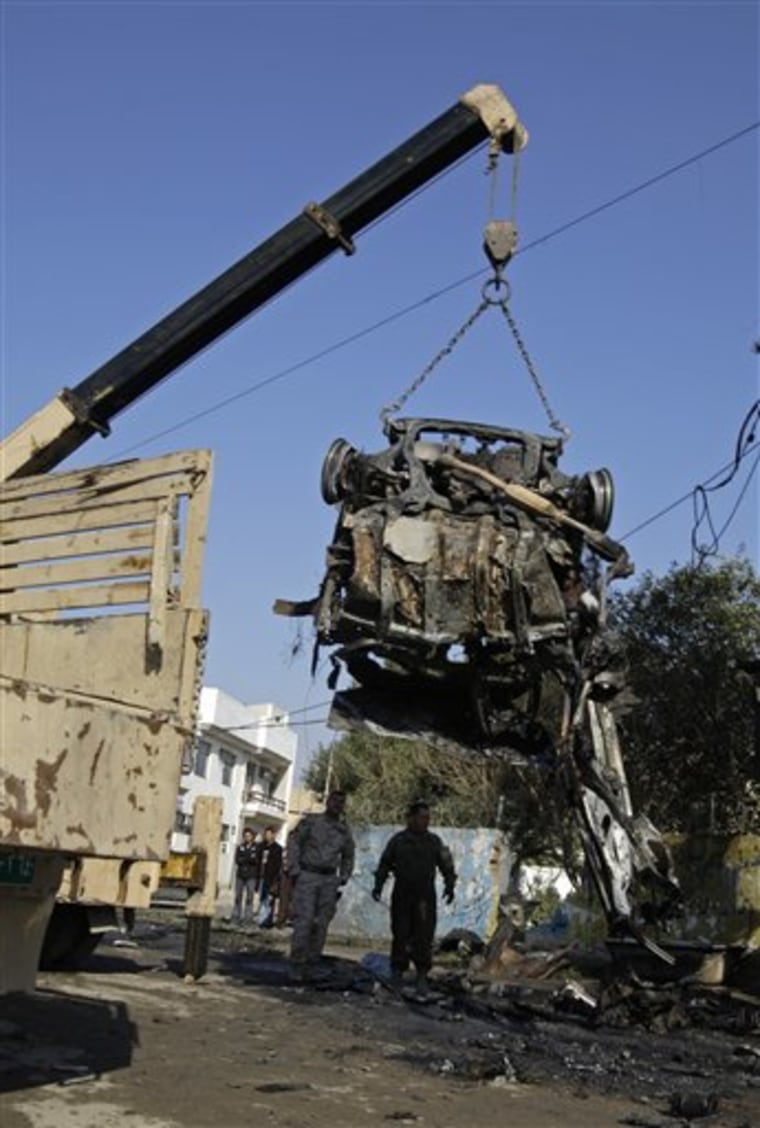A top official of Iraq's biggest Sunni party escaped assassination in a Baghdad car bombing that killed at least two other people Wednesday — 10 days ahead of an election that could reshape local power bases.
The U.S. military blamed al-Qaida in Iraq for the attack against Ziyad al-Ani, deputy secretary-general of the Iraqi Islamic Party and dean of the Islamic University, a Sunni institution.
His party said the blast was a "dangerous indication" of the perilous security in Iraq, even as President Barack Obama prepares to shift America's focus to Afghanistan.
The car blew up near al-Ani's convoy as it traveled through the former Sunni insurgent stronghold of Azamiyah in northern Baghdad.
Al-Ani, who said he survived two other assassination attempts last year, was not injured.
There were conflicting casualty reports, as is common in Iraq. The U.S. military initially reported college guards were killed but later said two Iraqi civilians had died. Iraqi police and hospital officials reported four people killed in the attack.
It was also unclear whether al-Ani was targeted because of his party position or his job as an educator.
Previous roadside bombs struck convoys carrying an undersecretary of the Ministry of Higher Education on Tuesday and the minister himself last week. None of the officials was injured.
Al-Ani said he believed al-Qaida was to blame. Al-Qaida largely controlled Azamiyah for years before rival Sunni tribal leaders decided to join forces with the Americans.
"The motive of the attack is to destroy the educational system and afterward the political process," al-Ani told The Associated Press by telephone. "They want to return us to square one, when they were able to spread chaos and terror through assassination attempts."
Warning signals
The U.S. military has warned that insurgents would likely step up attacks ahead of the Jan. 31 vote for ruling councils in 14 of Iraq's 18 provinces. Al-Ani was not a candidate in the elections. However, a strike against a senior political figure could serve as a warning signal to voters and to the party, which is part of Prime Minister Nouri al-Maliki's government.
Despite a dramatic drop in violence, attacks continue on a daily basis in Iraq. That has prompted U.S. commanders to warn that security here is fragile, even though the American public wants an end to the costly U.S. mission here.
Obama pledged during the U.S. election campaign to withdraw U.S. combat troops from Iraq within 16 months of taking office. A U.S.-Iraqi security agreement approved last November requires all U.S. troops to be gone by the end of 2011.
The new president met with his national security team Wednesday to discuss the wars in Iraq, which he wants to end, and in Afghanistan, where he wants to commit more troops.
Iraqi officials and some U.S. commanders have expressed concern that a speedy withdrawal might threaten the country's fragile security.
On Wednesday, the chairman of parliament's defense committee, Abbas al-Bayati, said the Iraqis hoped Obama would stick by the withdrawal timeline in the security agreement but were prepared for a faster U.S. departure.
"We already have a 'Plan B,' which is that we have the ability to deploy any needed troops to any hot area in Iraq," al-Bayati said. "We are capable of controlling the situation in the country and we believe we have passed the worst" despite a lack of air and artillery power.
Iranian influence
Government spokesman Ali al-Dabbagh also said Iraqi is willing to have the U.S. withdraw all its troops and assume security for the country before the end of 2011.
The security pact, which replaced a U.N. mandate for foreign forces, also gave the Iraqis control over a base housing an Iranian opposition group north of Baghdad.
National Security Adviser Mouwaffak al-Rubaie this week reportedly accused the People's Mujahedeen Organization of Iran of planning a suicide attack against Iraqi security forces, raising concern that the Iraqi government may try to expel the group from the country.
The Peoples' Mujahedeen, known as the Mujahedeen Khalq, denied the allegation as a "sheer lie."
Iraq is under pressure from neighboring Iran to deport the group but has pledged not to forcibly evict it. Although the U.S. has branded Peoples' Mujahedeen a terrorist organization, Washington does not want its members deported to Iran.
